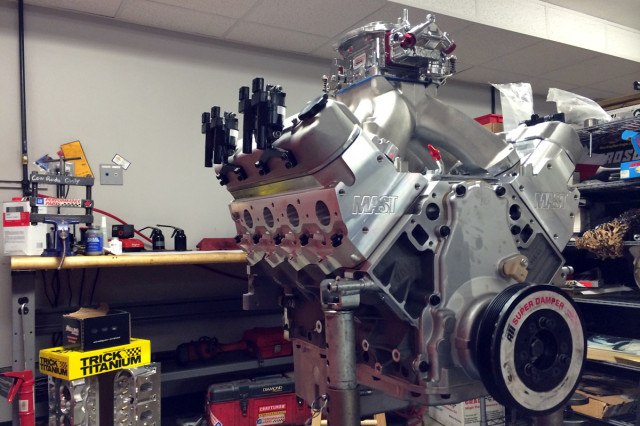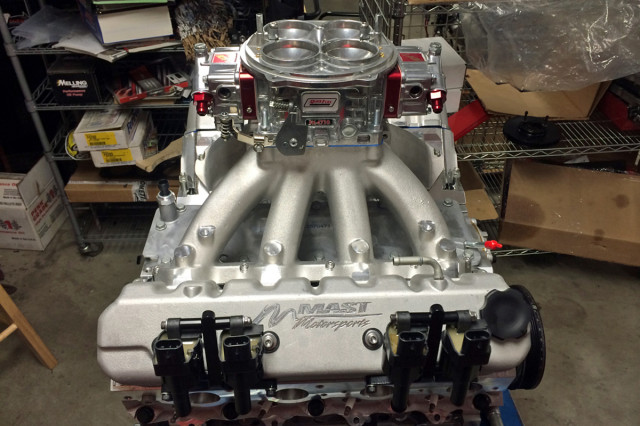Ever since the advent of electronic fuel injection and its subsequent adoption for mass-market use, there have been two schools of thought. On one side of the argument, there are enthusiasts and engine builders that feel a carbureted engine will always make more power than a fuel injected engine, and the other side of the argument states the inverse – that a properly tuned EFI-based powerplant will rule given the same conditions and the same engine. There have been countless tests run by multitudes of engine builders and magazines over the years to test this exact concept – yet the debate rages on with no clear winner.
The prevailing thought at EngineLabs’ HQ upon viewing this video of Mast Motorsports‘ Black Label 427 LS engine on the dyno is that the engine makes serious power, so a phone call was placed to find out the details on the engine’s specifics. On the other end of the line was Mast’s Chris Durrett, who spoke with EngineLabs back in March regarding another of their engines – a 440 cubic inch LS engine that belted out an impressive 707.9 horsepower and 597.8 pound-feet of torque.
Imagine the surprise when Durrett explained that the engine in this video was nearly the same product as the engine featured previously. Save for the different displacement (attributed to .030-inch more overbore on the first engine) and – yep, you guessed it, a carburetor – the engine in this video was good for 18.2 more peak horsepower on the Mast engine dyno. There’s one other change that was shocking; the carbureted engine in this video had one full point of compression LESS than the previously-featured EFI-controlled engine.
“From what we’ve seen, carbureted engines generally make more peak horsepower. They Quick Fuel carburetor worked out extremely well. We’re actually looking a offering a line of carbureted engines since they’ve been performing so well,” says Durrett.
The injected engine in video one (click the link) uses a 4.185-inch bore, a Callies 4.000-inch stroke forged crankshaft and forged connecting rods along with Diamond Racing pistons inside. The shortblock is topped off with Mast’s Black Label CNC-ported 305cc LS7 cylinder heads and a 4500-flange carburetor-style intake manifold outfitted with a Wilson 4500-series throttle body and Holley HP EFI system.
 The carbureted engine in today’s session uses the same components – right down to the manifold – save for a piston and bore that’s .030-inch smaller, resulting in the displacement drop to 427 cubic inches from the earlier engine’s 440 measurement. With the aforementioned point drop in compression, the Quick Fuel Technology 1050 Dominator-equipped carbureted engine belted out 726.1 peak horsepower, although the torque figure dropped from the earlier variant’s figure to a still-impressive 589.8 mark.
The carbureted engine in today’s session uses the same components – right down to the manifold – save for a piston and bore that’s .030-inch smaller, resulting in the displacement drop to 427 cubic inches from the earlier engine’s 440 measurement. With the aforementioned point drop in compression, the Quick Fuel Technology 1050 Dominator-equipped carbureted engine belted out 726.1 peak horsepower, although the torque figure dropped from the earlier variant’s figure to a still-impressive 589.8 mark.
“I think carburetor technology has come a long way from where it used to be. When we deal with Quick Fuel, we tell them what we’re building, and the carburetor shows up and it’s ready to go – we just drop it on and it makes the power. We didn’t touch it, and it made the power you see here,” he explains.
While he feels that there might have been a slight bit more left in the fuel-injected version on the tuning side of things, but the company has done a number of carbureted versions of their injected lineup and had the same results across the board – more peak horsepower from the carbureted engines.
With the 11.0:1 compression ratio in this engine, it’s completely streetable on regular old pump fuel, as was the previous engine even with it’s 12.0:1 compression ratio, as the fuel injection is more forgiving.
“These engines had the same hydraulic roller camshaft, our single plane intake, and the same cylinder heads. It’s an interesting comparison,” says Durrett.
An interesting comparison, indeed.


















